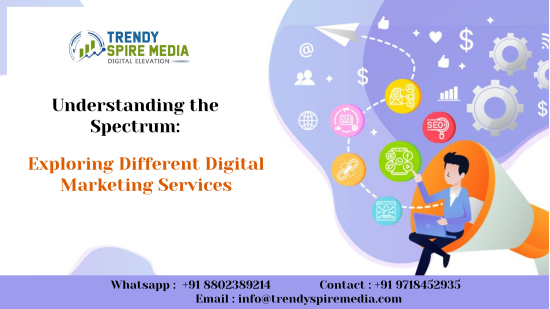Understanding the Spectrum: Exploring Different Digital Marketing Services
In the ever-evolving landscape of business, digital marketing has become the cornerstone of success. By leveraging the power of the Internet, businesses can reach global audiences, increase engagement, and increase their revenue. However, navigating the diverse range of Digital Marketing Services can be overwhelming. In this comprehensive guide, we will analyze different Digital Marketing Agency, explain their workings and how they contribute to the overall online presence.
1. Search Engine Optimization (SEO)
Overview
Search Engine Optimization (SEO) is the trendy spire media of Digital Marketing Company, focusing on enhancing a website's visibility on search engine results pages (SERP). By optimizing various elements, businesses can increase organic traffic and improve their online presence.
Key Components
Keyword Research: Identifying and targeting relevant keywords to align with user search queries.
On-Page Optimization: Optimizing content, meta tags, and HTML elements to enhance search engine ranking.
Off-Page Optimization: Building high-quality backlinks to improve a website's authority.
2. Social Media Marketing
Overview
Social Media Marketing involves leveraging social platforms to connect with the target audience, build brand awareness, and drive engagement.
Key Components
Content Creation: Developing engaging and shareable content tailored for each platform.
Social Media Advertising: Running targeted ads to reach specific demographics.
Community Management: Building and nurturing online communities for brand advocacy.
3. Content Marketing
Overview
Content marketing revolves around creating and distributing valuable, relevant content to attract and retain a clearly defined audience.
Key Components
Blogging: Publishing informative and engaging blog posts regularly.
Video Marketing: Creating and sharing video content on platform like YouTube and social media channels.
Info graphics: Using visual elements to communicate complex information in a digestible format.
4. Email Marketing
Overview
Email Marketing involves sending targeted messages to a specific audience to promote products or services, build relationships, and drive conversions.
Key Components
Segmentation: Dividing the audience into segments for personalized messaging.
Automation: Implementing automated workflows for timely and relevant communication.
Analytics: Monitoring email performance and adjusting strategies based on data.
5. Pay-Per-Click (PPC) Advertising
Overview
PPC Advertising allows businesses to place ads on search engines and other platforms, paying a fee only when the ad is clicked.
Key Components
Keyword Bidding: Competing for ad placement through bidding on relevant keywords.
Ad Copywriting: Creating compelling and concise ad copy to attract clicks.
Conversion Tracking: Monitoring and optimizing campaigns for desired actions.
6. Influencer Marketing
Overview
Influencer Marketing involves collaborating with influencers to promote products or services to their followers.
Key Components
Influencer Selection: Identifying influencers whose audience aligns with the brand.
Campaign Strategy: Planning and executing campaigns that resonate with the influencer's style.
Performance Evaluation: Measuring the success of campaigns through engagement metrics.
7. Affiliate Marketing
Overview
Affiliate Marketing is a performance-based strategy where businesses reward affiliates for driving traffic or sales to their website through the affiliate's marketing efforts.
Key Components
Affiliate Networks: Joining platforms that connect businesses with potential affiliates.
Commission Structure: Determining how affiliates will be compensated for their efforts.
Tracking and Analytics: Monitoring affiliate-generated traffic and conversions.
8. Mobile Marketing
Overview
Mobile Marketing involves reaching a target audience on their mobile devices through various channels, including apps, SMS, and mobile-optimized websites.
Key Components
Mobile Advertising: Creating ads specifically designed for mobile platforms.
App-Based Marketing: Promoting products or services through mobile applications.
Location-Based Marketing: Delivering targeted messages based on the user's location.
9. Analytics and Data Analysis
Overview
Analytics and Data Analysis play a Trendy Spire Media role in digital marketing training company by providing insights into user behavior, campaign performance, and overall ROI.
Key Components
Data Collection: Gathering relevant data from various digital marketing channels.
Performance Metrics: Analyzing key performance indicators (KPIs) to evaluate success.
Optimization Strategies: Adjusting marketing strategies based on data-driven insights.
10. Reputation Management
Overview
Reputation Management involves monitoring, influencing, and controlling an individual or brand's online reputation.
Key Components:
Online Reviews: Managing and responding to customer reviews on various platforms.
Crisis Management: Developing strategies to address and mitigate potential reputation crises.
Brand Monitoring: Regularly tracking mentions and sentiment about the brand online.
Conclusion
In the dynamic realm of Digital Marketing Training Services, success lies in a strategic and diversified approach. Businesses must navigate the multitude of services available to create a cohesive and effective online presence. From SEO and social media to email marketing and analytics, each component plays a vital role in reaching and engaging target audiences. By understanding and implementing these digital marketing services, businesses can unlock the full potential of the digital landscape, driving growth and staying ahead in the competitive online arena.


Comments
Post a Comment